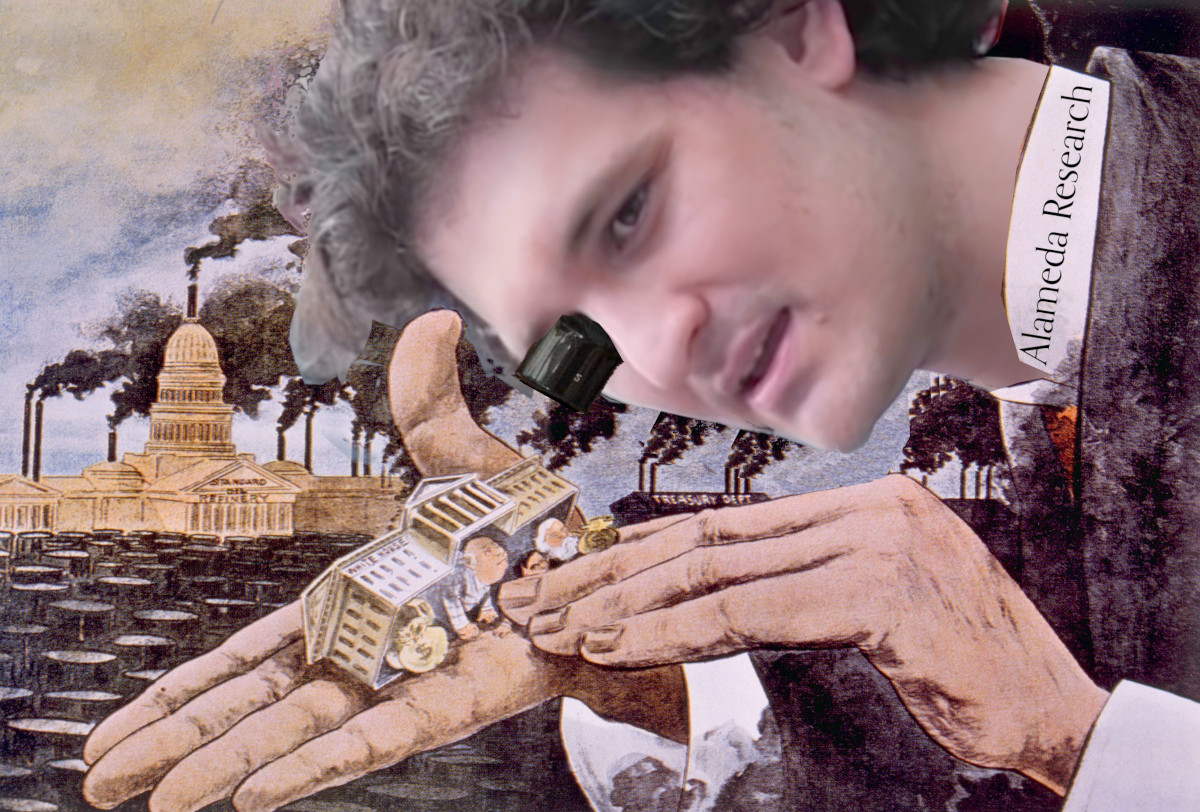
FTX's collapse left a million creditors holding the bag for a chaotically managed, corrupt enterprise that created vast personal fortunes for the conspirators who ran it, even as it stole the life's savings of retail investors who bought into its lies. 1/ 

If you'd like an essay-formatted version of this thread to read or share, here's a link to it on pluralistic.net, my surveillance-free, ad-free, tracker-free blog:
pluralistic.net/2022/11/23/inc… 2/
pluralistic.net/2022/11/23/inc… 2/
Could the unsuspecting public have been shielded from the FTX Ponzi scheme? Hindsight is 20/20, but there's good reason to believe that FTX could have been brought down in a controlled glide, rather than a nose-first crash landing and ensuing fireball. 3/
Earlier this year, the @SECGov sent FTX a letter inquiring into its business practices - a letter that sought to determine whether FTX was as scammy as it appeared. 4/
The SEC never got the answers it sought, thanks to the intervention of eight Members of Congress - the #BlockchainEight, four Dems and four Republicans - who wrote to Chairman @GaryGensler demanding that he back off:
emmer.house.gov/_cache/files/0… 5/
emmer.house.gov/_cache/files/0… 5/
Five of Blockchain Eight received cash contributions from FTX founder #SamBankmanFried (#SBF), his employees, businesses and PACs. Bankman-Fried is widely characterized as a Democratic super-donor, but his political spending is basically 50-50:
opensecrets.org/orgs/recipient… 6/
opensecrets.org/orgs/recipient… 6/
SBF posed as a philosopher king, devotee of esoteric ethics, a concerned billionaire, committed to saving the world from ugly politicals, after the collapse, he confessed that this was all marketing nonsense ("this dumb game we woke westerners play"):
vox.com/future-perfect… 7/
vox.com/future-perfect… 7/
SBF and his co-conspirators gave money to politicians to further their own ends, not to save the world. They understood that if they gave money to politicians, that politicians would intercede to keep regulators from keeping them honest. 8/
The SEC's questions went to the heart of the FTX fraud, seeking to establish that FTX was marketing unregulated securities disguised as a "rewards" program, and that FTX was stealing from depositors and handing their money to its hedge-fund affiliate Alameda to gamble with. 9/
Hedge-fund managers are notoriously bad at their jobs, generally underperforming a low-load S&P 500 index fund, but even by those low standards, Alameda was a very bad hedge-fund, losing $3.7b in a "raging crypto bull market."
https://twitter.com/GRDecter/status/159506529877165670410/
SBF's reputation as a boy-wonder genius wasn't due to returns to Alameda, but rather the limitless funds that Alameda tapped for more failed investments. Those funds, we now know, were stolen from FTX's customers - exactly the kind of thing an SEC investigation could uncover. 11/
The vast sums of (real) money the crypto industry pumped into electoral politics is closely related to its bull run - campaign contributions muzzled finance watchdogs, which let the industry defraud the public, which gave it more money for campaign contributions. 12/
This is a completely foreseeable outcome of unlimited campaign finance, especially the "dark money" finance that the 2010 *Citizens United* decision unleashed. 13/
*CU* removed the final barrier to massive influence campaigns by the ultra-rich, who poured money into the political system:
opensecrets.org/news/reports/a… 14/
opensecrets.org/news/reports/a… 14/
The irony here is that the same wealthy people who argued that "money was speech" and campaign finance was merely a way for people to exercise their First Amendment rights are also the foremost proponents of a political ideology whose central tenet is "incentives matter." 15/
These are the same people who say that every visit to the doctor should cost money, lest we create a #MoralHazard that invites people who aren't really sick to go bother the doctor for shits and giggles. 16/
It goes without saying that these co-payments are titrated to keep poor people from visiting the doctor, while the rich never feel the sting) (that's because rich people don't suffer moral hazard). 17/
This belief in incentives as the final arbiter of all behavior is the fundamental tenet of #economism, and it underpins all our cruelest policies. For an economismist, anyone espousing a sense of duty or mission is merely "virtue signalling":
pluralistic.net/2022/10/27/eco… 18/
pluralistic.net/2022/10/27/eco… 18/
This slavish belief in incentives is why would-be aristocrats like Sam Walton prohibited his executives from taking so much as a glass of water from vendors' salesmen, lest they become tempted into favoring the salesman's commissions over #Walmart's profits. 19/
But these exact same people profess a belief in unlimited political spending as a means to *better* governance. Somehow, a glass of water will corrupt a corporate buyer, but a $100m super-PAC donation will have no impact on the judgment of an elected official. 20/
Covering the Blockchain Eight bribery scandal for @TheProspect, @ddayen hearkens back to the #KeatingFive scandal of 1987, when five senators wrote to the Federal Home Loan Bank Board to insist that they lay off Lincoln Savings and Loan:
prospect.org/power/congress… 21/
prospect.org/power/congress… 21/
Lincoln's chairman, Charles Keating Jr, had donated $1.3m to the Keating Five between 1982-7, and their letter convinced the FHLBB to close its investigation, whereupon Lincoln promptly collapsed, sticking the American public with a $3.4b bailout bill. 22/
Like the Keating Five, the Blockchain Eight set out to stop regulators from investigating a company that was engaged in a titanic fraud. Like the Keating Five, the Blockchain Eight benefited from sizable campaign contributions from the industry they caped for. 23/
Unlike the Keating Five - who faced a Senate ethics inquiry and sanctions - the Blockchain Eight are completely unrepentant. The Eight's ringleader, @RepTomEmmer (R-MN) has even accused SEC Chairman Gensler of secretly being in the tank for FTX:
https://twitter.com/RepTomEmmer/status/159071737480180940924/
Just last week, Emmer told the Blockchain Association, "You are here to stay...[nobody should] rush in and put a huge wet blanket of regulation atop this industry just because something didn’t go right."
coindesk.com/policy/2022/11… 25/
coindesk.com/policy/2022/11… 25/
Emmer is on the House Financial Services Committee, along with five other members of the Blockchain Eight: @RitchieTorres (D-NY), @RepJoshG (D-NJ), @RepAuchincloss (D-MA), @WarrenDavidson (R-OH), and @RepTedBudd (R-NC). 26/
This is the committee charged with investigating the FTX fraud.
The great irony of the right's incentives exceptionalism and its belief in unlimited political bribes is that it leads to the creation of a *larger* state. 27/
The great irony of the right's incentives exceptionalism and its belief in unlimited political bribes is that it leads to the creation of a *larger* state. 27/
Allowing companies to bribe politicians and capture regulators fuels both corporate growth and corporate corruption.
doctorow.medium.com/regulatory-cap… 28/
doctorow.medium.com/regulatory-cap… 28/
If the state is to counter that corruption, it must be as powerful as the companies it oversees. The bigger those companies are, the bigger the state has to be. If you truly want a less intrusive, less muscular state, the first step is reining in corporate power. 29/
Image:
Cointelegraph (modified)
commons.wikimedia.org/wiki/File:Sam_…
CC BY 3.0
creativecommons.org/licenses/by/3.… 30/
Cointelegraph (modified)
commons.wikimedia.org/wiki/File:Sam_…
CC BY 3.0
creativecommons.org/licenses/by/3.… 30/
• • •
Missing some Tweet in this thread? You can try to
force a refresh












